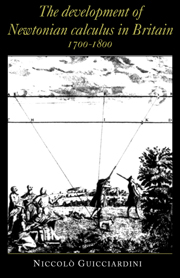Book contents
- Frontmatter
- Contents
- Introduction
- OVERTURE: NEWTON'S PUBLISHED WORK ON THE CALCULUS OF FLUXIONS
- PART I THE EARLY PERIOD
- PART II THE MIDDLE PERIOD
- PART III THE REFORM
- CONCLUSION
- APPENDIX A TABLES OF CONTENTS OF FLUXIONARY TEXTBOOKS
- APPENDIX B PRICE LIST OF MATHEMATICAL BOOKS PRINTED FOR JOHN NOURSE
- APPENDIX C CHAIRS IN THE UNIVERSITIES
- APPENDIX D MILITARY ACADEMIES
- APPENDIX E SUBJECT INDEX OF PRIMARY LITERATURE
- APPENDIX F MANUSCRIPT SOURCES
- Notes
- Bibliography
- Index
CONCLUSION
Published online by Cambridge University Press: 14 September 2009
- Frontmatter
- Contents
- Introduction
- OVERTURE: NEWTON'S PUBLISHED WORK ON THE CALCULUS OF FLUXIONS
- PART I THE EARLY PERIOD
- PART II THE MIDDLE PERIOD
- PART III THE REFORM
- CONCLUSION
- APPENDIX A TABLES OF CONTENTS OF FLUXIONARY TEXTBOOKS
- APPENDIX B PRICE LIST OF MATHEMATICAL BOOKS PRINTED FOR JOHN NOURSE
- APPENDIX C CHAIRS IN THE UNIVERSITIES
- APPENDIX D MILITARY ACADEMIES
- APPENDIX E SUBJECT INDEX OF PRIMARY LITERATURE
- APPENDIX F MANUSCRIPT SOURCES
- Notes
- Bibliography
- Index
Summary
has my research been successful in refuting the accepted views on the crisis of the Newtonian calculus? None of these views corresponds to the image we obtain from a close scrutiny of the fluxional texts. Nevertheless, the label ‘dotage’ still attaches to the treatises on fluxions we have encountered. A crisis did occur, but it set in later than is usually thought.
During the first four decades of the eighteenth century the calculus of fluxions was developed by men such as Cotes, Taylor, Stirling and Maclaurin. With their work they made original and important contributions to the fields of integration, series and applied mathematics. The British began losing ground in the 1740s. In the mid-eighteenth century only Simpson and Landen achieved new results. Very soon many British mathematicians realized the gap which separated them from the continentals and several attempts were made to change this situation of isolation. We have seen how slow and complex was this process of reform, which began with Simpson, Landen and Waring, and was continued especially by Playfair, Ivory, Wallace, Woodhouse, Brinkley and the Analytical Society's fellows.
The era of the Newtonian calculus cannot be simply described as a period of decline. It was a period of the history of British mathematics which began with successes, suffered a period of crisis, and ended with serious attempts to reform.
- Type
- Chapter
- Information
- The Development of Newtonian Calculus in Britain, 1700–1800 , pp. 139 - 142Publisher: Cambridge University PressPrint publication year: 1989



